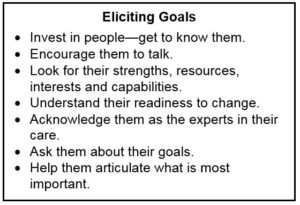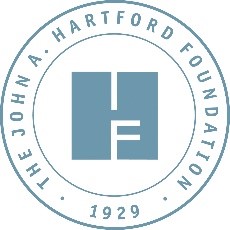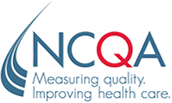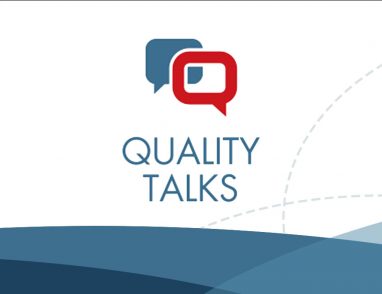Person-Centered Care Planning: Eliciting and Negotiating Goals
March 2, 2016 · Jessica Briefer French
(NOTE: This is the second post in a three-part blog series evaluating person-centered care planning)
It should be as simple as this: an individual’s goals should drive care. Providers waste health care resources when they discount the goals of the person receiving care. They further disengage the individual when they don’t honor his or her goals. How can we help people achieve their goals and ensure they have considered the best clinical information? How can care managers engage individuals in setting goals that meet their personal needs?
A recent NCQA case study, funded by The SCAN Foundation and the John A. Hartford Foundation, found some common approaches to answering those questions. To be successful, a care manager must not only understand the perspectives and goals of the individual receiving care, but respect them, even if they differ from the care manager or provider’s assessment or from best clinical practice. Progress depends on ownership. People are naturally more inclined to pursue the goals they define and own, than those selected by others.

So, how do we get past the conflicts? How can a care manager and an individual reach consensus on goals, and on a shared plan of care?
Find out what is important to the person. A man with morbid obesity was admitted to the hospital repeatedly for various complications. After losing 200 pounds, he still weighed over 500 pounds. Given his weight and multiple health challenges, his care team thought he would be safest and best served in a rehabilitation facility. The man insisted on staying in his apartment.
Care managers need special skills to elicit and negotiate goals effectively—the ability to establish trust, to listen and to identify and recommend solutions to potential barriers. An astute listener can understand an individual’s history, context and values. The ability to ferret out challenges and barriers (including those a person might want to keep secret, such as an unsafe living environment, an abusive caregiver, mental illness or addiction) can prevent catastrophe.
Negotiate. The care manager listened to the man’s goals and responded. He supported the man’s choice to live at home and met his clinical needs for improved home safety by arranging for home care services. He documented the individual’s choice to remain at home and the care team’s recommendation of going to a rehabilitation facility in the care record.
When negotiating goals—or interventions to address goals—care managers should provide information about the risks and benefits of various options. A well-placed suggestion can be a springboard for a discussion, especially if the care manager is willing to be corrected or redirected and ask, Did I get this right?
Ultimately, people bring their own needs, lifestyle, preferences and desires to the goal setting process. Successful care managers don’t assume they know what’s most important; they draw out the individual’s perspectives and goals and in that way, encourage a partnership.
Next Up: Part three of the three-part series on Person-Centered Goal Planning will discuss “Monitoring and Supporting Goal Attainment.” Read Part 1: “Do We Agree on What Matters Most?”
Setting Goals with Vulnerable People: A Collaborative Approach
Policy Approaches to Advancing Person-Centered Outcome Measurement
Goals to Care: How to keep the person in “person-centered”
Supported by grants from The SCAN Foundation and The John A. Hartford Foundation:
The SCAN Foundation—advancing a coordinated and easily navigated system of high-quality services for older adults that preserve dignity and independence. For more information, visit www.TheSCANFoundation.org.
The John A. Hartford Foundation, based in New York City, is a private, nonpartisan philanthropy dedicated to improving the care of older adults. For more information, please visit www.jhartfound.org.











